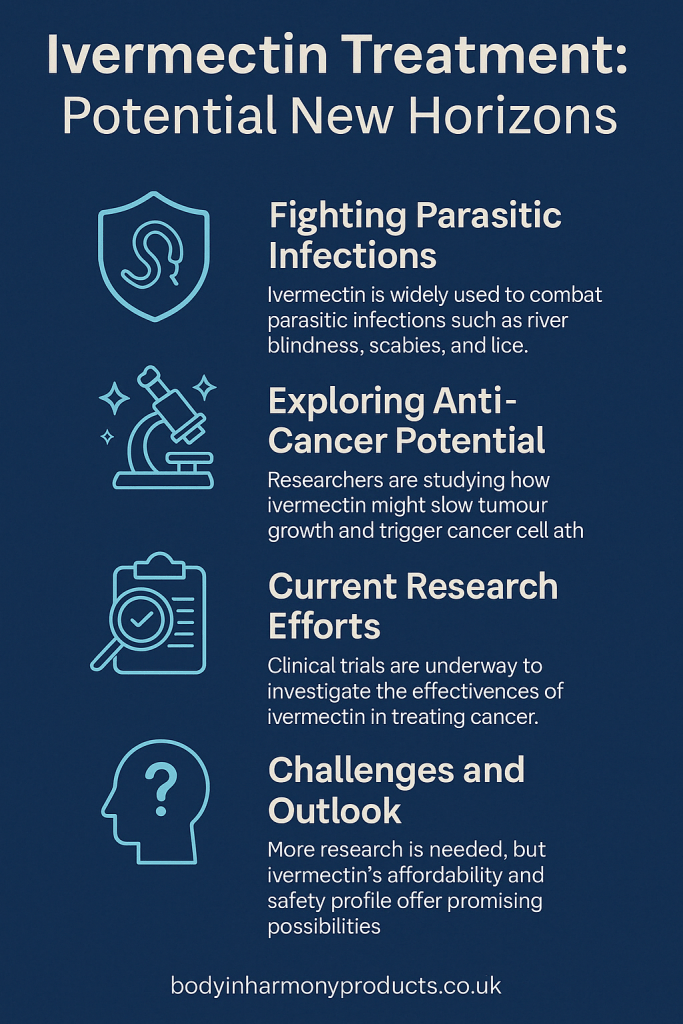Ivermectin Treatment: Exploring Its Potential Beyond Parasite Control
Ivermectin treatment has captured global attention for its remarkable ability to combat parasitic infections. However, recent studies suggest that this long-standing medication might also hold promise in the fight against cancer. Scientists around the world are exploring its effects on tumour cells and cancer pathways, aiming to unlock new treatment strategies that could benefit countless patients.
Originally, ivermectin gained fame as a potent antiparasitic agent used in both animals and humans. It was lauded for treating river blindness and lymphatic filariasis across developing nations, dramatically improving millions of lives. Today, researchers are broadening their perspective to investigate whether this well-established medicine can also disrupt cancer cells.
This unexpected avenue of research stems from intriguing laboratory findings on how ivermectin interacts with cellular pathways. Some experts propose that these interactions might slow tumour growth or even trigger cancer cell death. As a result, researchers are devoting more attention to clinical trials to test its efficacy in human patients. Consequently, public interest in ivermectin treatment has soared, fuelled by hope of a cost-effective weapon against two formidable foes.
A Brief History and Conventional Uses of Ivermectin
Japanese microbiologist Satoshi Ōmura and Irish parasitologist William C. Campbell discovered ivermectin in the late 1970s. They isolated compounds from soil samples that showed strong antiparasitic properties in animal studies. Eventually, these researchers refined those compounds into a medication that revolutionised global health efforts, earning them the Nobel Prize in Physiology or Medicine in 2015.
Ivermectin’s initial use was in livestock, treating worms and other parasites. Soon after, its efficacy in human conditions became clear, particularly against river blindness and strongyloidiasis. The World Health Organization endorsed mass drug administration programs, dramatically cutting infection rates across vulnerable regions.
Today, healthcare providers continue to rely on ivermectin treatment for parasitic conditions like scabies and head lice. Thanks to its proven safety profile, researchers are now assessing its broader potential in other diseases, including its emerging role in oncology.
The Emerging Anti-Cancer Research on Ivermectin
Recent studies highlight several mechanisms through which ivermectin might exert anticancer effects. Firstly, it appears to interfere with cellular signalling pathways involved in tumour progression and metastasis. By blocking crucial proteins, ivermectin could potentially limit the spread of malignant cells.
Moreover, researchers have observed promising effects in laboratory models of breast cancer, lung cancer, and leukaemia. Consequently, they suspect that the drug’s scope could extend across various malignancies. However, large-scale human studies are still essential to confirm these early observations and translate them into clinical practice.
Despite early optimism, experts caution that ivermectin is not yet a proven cure for cancer. Ongoing clinical trials aim to clarify its role and identify the patient populations that could benefit most. Furthermore, investigators are exploring whether combining ivermectin with standard treatments could enhance effectiveness.
How Ivermectin Treatment Works Against Parasites
Ivermectin’s traditional antiparasitic action involves disrupting nerve signals in target organisms. It binds to glutamate-gated chloride channels, leading to paralysis and eventual death of the parasite. Importantly, the drug selectively targets invertebrate nerve and muscle systems, sparing human cells.
Moreover, ivermectin’s broad-spectrum action means it can tackle worms, mites, and some insects. It is administered both orally and topically, depending on the infection. As a result, ivermectin remains vital for treating multiple parasitic diseases in regions with limited healthcare access.
Potential Synergies Between Ivermectin and Cancer Therapies
Scientists are increasingly intrigued by the idea that ivermectin could complement existing cancer treatments. Some theories suggest that it might enhance the immune system’s ability to recognise and attack cancer cells. Additionally, researchers are investigating whether ivermectin could help reduce drug resistance when used alongside chemotherapy or targeted therapies.
While no definitive conclusions have been reached yet, the growing body of research is encouraging. Consequently, funding agencies are beginning to support studies that explore these innovative combinations, hoping to expand available treatment options.
Current Clinical Trials and the Regulatory Landscape
Clinical trials examining ivermectin treatment for cancer are currently underway across several countries. Phase I and II studies are investigating safety profiles, dosage levels, and preliminary efficacy, often in combination with other standard treatments.
However, obtaining regulatory approval for a new cancer indication requires extensive evidence. While ivermectin’s long history of safe use in parasitic infections is a strong foundation, rigorous testing in oncology settings remains essential.
Therefore, although progress is being made, a fully approved cancer use for ivermectin could still be several years away.
Addressing Misinformation and the COVID-19 Controversy
Ivermectin made headlines during the COVID-19 pandemic, leading to widespread debate about off-label use. Some hailed it as a miracle drug, while others criticised the lack of robust human data supporting its use.
Although controversial, this period highlighted the urgent need for well-designed clinical studies into ivermectin’s broader medical applications. Researchers and healthcare providers continue to stress that rigorous evidence must guide treatment recommendations, especially when it comes to serious diseases like cancer.
Challenges and Limitations in Ivermectin Research
Like any medication, ivermectin can cause side effects, including dizziness, skin rashes, and digestive upset. When used responsibly under medical supervision, these reactions are generally mild. Nevertheless, cancer patients often have compromised immune systems, which can amplify treatment risks.
In addition, funding large-scale clinical trials remains challenging because ivermectin is a generic drug. Without strong pharmaceutical investment, much of the research burden falls on academic institutions and non-profit organisations.
Therefore, global collaboration and public funding will be crucial in confirming ivermectin’s potential role in future cancer care.
The Future Outlook for Ivermectin Treatment
Scientists remain cautiously optimistic about ivermectin’s possibilities in cancer therapy and parasite control. Thanks to its affordability and extensive safety record, it stands as a strong candidate for broader use — but only if future studies validate its benefits conclusively.
Advanced genomic and proteomic tools could soon reveal exactly how ivermectin interacts with complex biological systems. As a result, more personalised approaches to using ivermectin in oncology may eventually emerge.
For now, experts advise a balanced view — hopeful, yet grounded firmly in scientific rigour.
Final Thoughts
Ivermectin’s journey from a revolutionary antiparasitic agent to a potential cancer therapy is a fascinating example of scientific discovery. Although excitement is building, rigorous clinical trials and cautious clinical practice must come first.
For patients and healthcare providers alike, curiosity should always be paired with caution. Ongoing research will determine whether ivermectin treatment can truly fulfil its expanding promise across both parasitic and cancer care.
Ultimately, ivermectin’s story reminds us of medicine’s incredible ability to evolve — and the exciting possibilities still waiting to be uncovered.
You might also find these studies interesting:
-
Is Arthritis Genetic? – Explore how genetics may influence the risk of developing arthritis and what current research says about inherited factors.
-
Out-of-Hospital Cardiac Arrest in Healthy Young Adults – Discover surprising findings on cardiac events in seemingly healthy young individuals and the urgent need for awareness.





